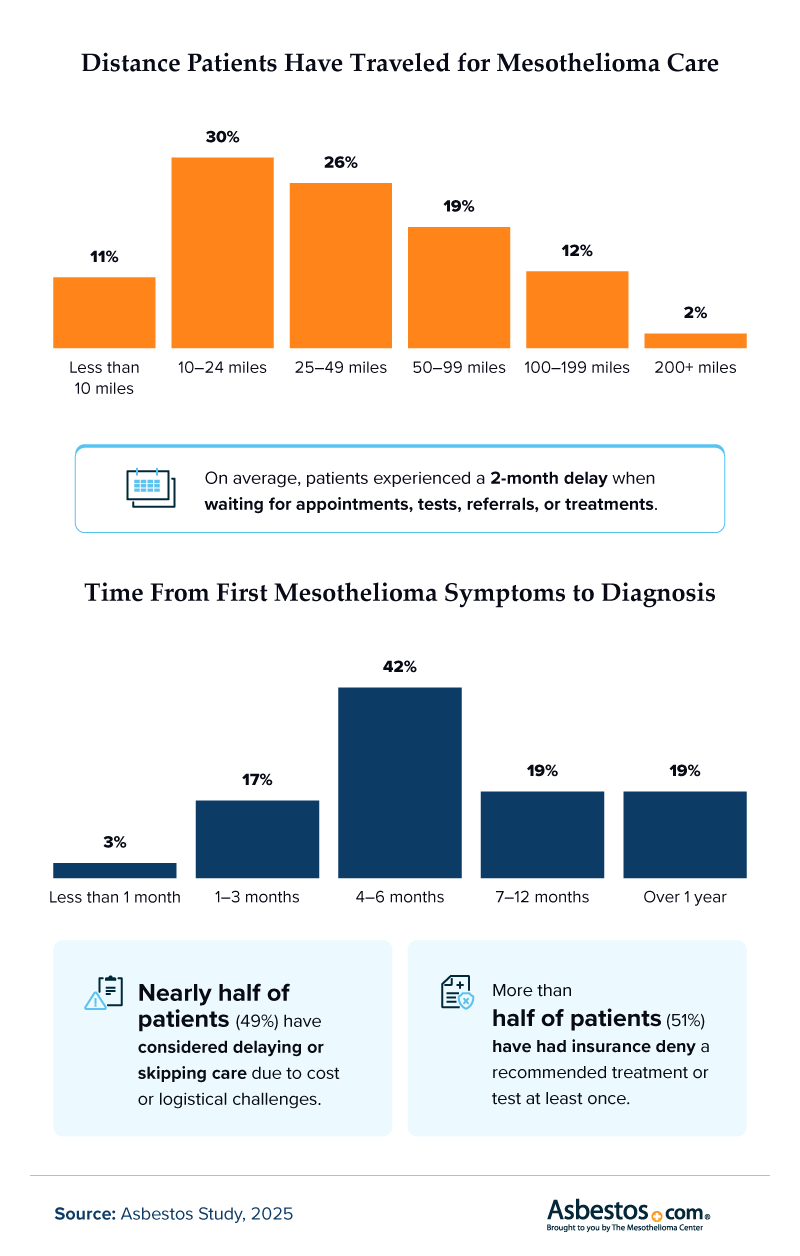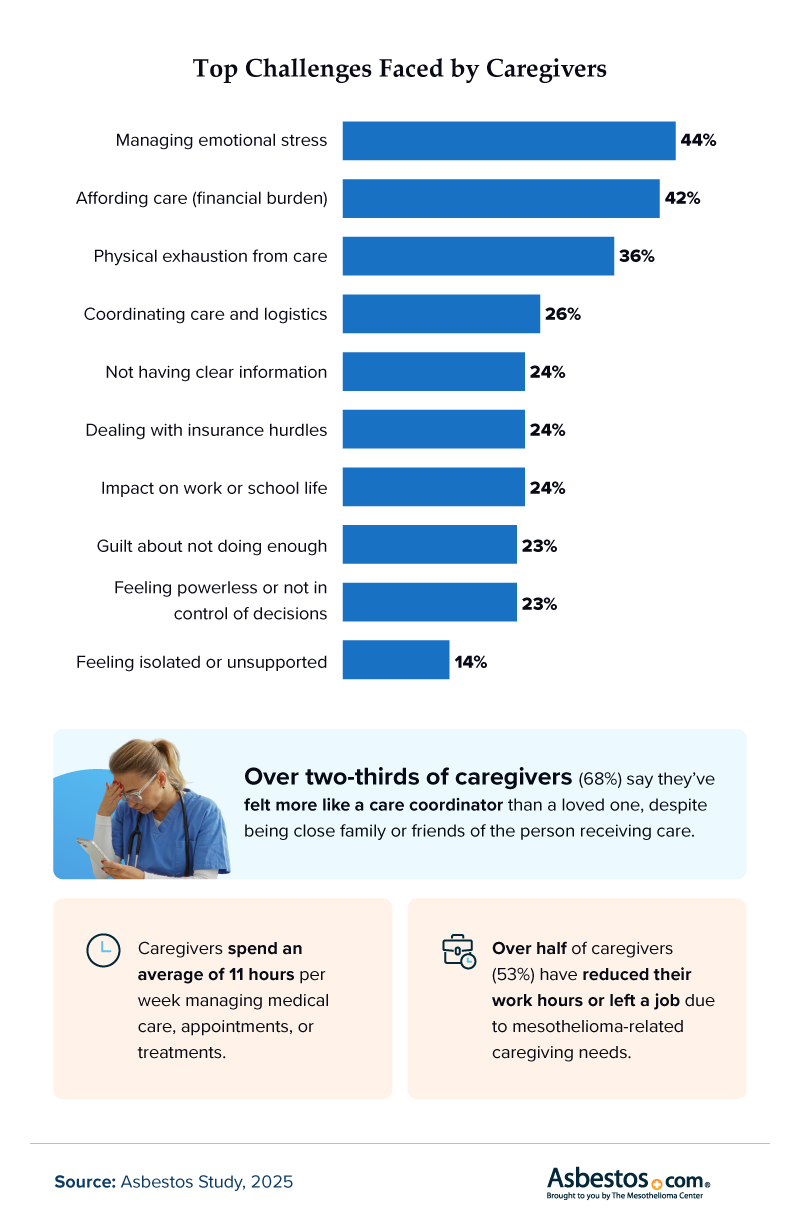Tamron Little was diagnosed with peritoneal mesothelioma at the age of 21. In her article, she shares how the diagnosis affected her mental health, leading to changes in sleep patterns, loss of interest in activities, physical symptoms and social withdrawal. Recognizing these signs prompted her to seek therapy, which she found beneficial in managing the emotional challenges of living with a rare cancer. Tamron emphasizes the importance of addressing mental health alongside physical health during the cancer journey.
The Mesothelioma Waiting Game: How Delays in Care Put Lives at Risk

Written by Karen Selby | Edited by Walter Pacheco
Timely medical care is essential for mesothelioma patients, but many face frustrating delays and challenges that affect their diagnosis and treatment journey. A national survey of 193 patients and caregivers revealed how barriers such as insurance denials, travel burdens, and limited access to specialists impact care.
Key Takeaways
- 1 in 2 patients (51%) were denied a recommended test or treatment by their insurance provider at least once.
- 1 in 2 caregivers (53%) reduced their work hours or left a job due to mesothelioma-related caregiving or treatment needs.
- 3 in 5 caregivers (60%) say there aren’t enough mental health resources available for patients and caregivers.
- 3 in 4 caregivers (74%) say online communities have been helpful during their experience, 3 in 5 (58%) say they’ve helped sometimes, and 1 in 6 (16%) rely on them often.
- Nearly 1 in 10 mesothelioma patients (9%) waited more than 6 months for an appointment, referral or treatment.
- More than 1 in 10 patients (12%) had to travel 100-199 miles for mesothelioma care.
The findings highlight a pressing need to address geographic and systemic inequalities so that all mesothelioma patients can receive the care they deserve without delay.
Long Delays and Long Distances Disrupt Care
Mesothelioma patients often face critical delays and travel challenges that affect their care, confidence in providers, and treatment decisions.

Nearly 1 in 10 patients waited more than six months to receive an appointment, test, referral or treatment. When symptoms first appeared, many patients experienced a two-month delay on average before getting the care they needed. A lack of clarity about symptoms or when to seek medical help contributed to these delays for 38% of patients.
Travel added another layer of difficulty. Nearly three-quarters of patients had to leave their local area for treatment. More than half traveled to a different city within their state, and 20% crossed state lines. Only 28% received all their mesothelioma care locally. Even with these challenges, more than 4 in 5 respondents felt confident in their local healthcare providers’ ability to manage their care.
Scheduling setbacks and system-level issues further complicated timely diagnosis and treatment. Patients cited misdiagnosis or vague symptoms (37%), long scheduling wait times (35%), insurance approval delays (32%), and limited access to specialists (31%) as common barriers. Distance to care centers (30%) and referral delays (19%) also contributed to prolonged wait times.
These challenges prompted many patients to seek additional guidance. Over 3 in 5 pursued a second opinion during their journey. Among them, 43% said their initial diagnosis or treatment plan was unclear, and 42% wanted confirmation before starting care. Others sought specialists (38%), were encouraged by loved ones (38%), or explored clinical trials and advanced treatments (34%). Some patients lacked trust in their original provider (24%), were required by insurance to seek another opinion (22%), or felt their local doctor lacked experience with mesothelioma (21%).
“One of the biggest challenges with cancers like mesothelioma is diagnosing the disease too late. Many cancers are treatable, with expectations for long-term control or even cure, if treated in their early stages,” explains Dr. Daniel Landau, M.D., oncologist & hematologist at The Medical University of South Carolina.
“In the early stages of mesothelioma, surgery is often a possibility. However, once the disease is more advanced, surgery will no longer be sufficient to control the disease. Other treatments, like chemotherapy, become more necessary. Unfortunately, these treatments will not cure the disease. Early diagnosis remains the best way to offer long-term control and better treatment outcomes.”
The Emotional Toll on Caregivers and the Path Toward Better Support
Caregivers play a critical role in mesothelioma care, often taking on responsibilities that leave them emotionally drained and in need of more support.

Nearly 3 in 4 caregivers described the experience as moderately to extremely emotionally overwhelming. Many felt isolated in their role, and 21% said they lacked support from the health care system. Mental health needs were a major concern: 60% of caregivers said there aren’t enough resources available for patients and caregivers. While 40% sought help during the experience, 17% wanted support but couldn’t access or afford it, and 43% did not seek any assistance.
Online communities emerged as vital lifelines. About 74% of caregivers found them helpful, 58% said they helped sometimes, while 16% said they relied on them often.
Patients also reflected on what could have made their care journey easier. Many wished for more accessible information (38%) and financial help for travel and lodging (37%). Others said that more local specialists (36%) and support navigating insurance paperwork (36%) would have made a difference. Faster referrals (35%), access to care coordinators (34%), and better communication (34%) were also highly desired. Patients emphasized the value of emotional or peer support (26%) and easier access to second opinions (29%).
In my experience, when patients first reach out to me after being diagnosed with mesothelioma, they often share just how difficult it was to get to this point. Waiting weeks, or even months, for a diagnosis is one of the most common experiences they describe. By the time we speak, they’re already emotionally and physically drained from the delays, uncertainty, and frustration they’ve faced. For many, the idea of finding a true mesothelioma expert feels like an overwhelming and almost impossible task.
Real Stories Behind the Statistics
Michael Cole, a pleural mesothelioma survivor, emphasizes the importance of supporting the body, mind and spirit throughout cancer treatment. In reflecting on his journey, Cole shares how faith, prayer, meditation, and connection to community helped him manage the mental and emotional challenges of his diagnosis. He encourages fellow patients to maintain a positive mindset and lean on spiritual support systems, noting that healing goes beyond the physical. His story highlights how emotional resilience and inner strength play a vital role in surviving mesothelioma.
Kim Madril, a registered nurse, was diagnosed with pleural mesothelioma in July 2019, not long after surviving breast cancer. Although she initially hoped to keep working, she ultimately stepped away from her nursing career due to the physical demands of the job. “Because of my diagnosis, I didn’t feel I was in a position to take care of patients like I used to,” she said. “I didn’t feel that I had the stamina because I put my heart and soul into my nursing career.” Beyond the emotional toll, the financial burden was also significant, but seeking legal compensation helped ease that stress. “Getting compensation was the best decision ever. I’m so happy I did it. It softens the blow knowing I have resources because medical insurance doesn’t cover everything,” Madril explained. “If I didn’t have that compensation, I’d have been in debt for the rest of my life.”
Finding Compassionate, Timely Care for Every Patient
Mesothelioma patients and caregivers often face long waits, confusing care paths, and difficult trade-offs to get the treatment they need. From delayed diagnoses to travel costs and limited mental health resources, these obstacles reveal serious care access gaps. Solutions that focus on equity, timely referrals, local care options, and emotional support can help lift the burden and ensure every patient receives compassionate, timely treatment.
For example, The Mesothelioma Center at Asbestos.com created a Doctor Match program that connects patients with 500+ top mesothelioma specialists across the country. This resource helps families navigate treatment faster by matching them with the right doctor based on location, diagnosis, insurance, and personal preferences.
Whether you’re still waiting for a referral or feel unsure about your options, our team is here to help you find a specialist who understands your case and can get you on the path to treatment as soon as possible.
Methodology
We surveyed 193 mesothelioma patients and caregivers to better understand the delays and obstacles they face throughout the diagnosis and treatment process. The average age of respondents was 37; 44% were women, 55% were men, and 1% were non-binary. Due to rounding, some percentages in this study may not total 100% exactly.
About Asbestos.com
The Mesothelioma Center at Asbestos.com is the nation’s most trusted mesothelioma resource. We provide patients and families with personalized support, help them access financial and legal resources, and connect them to top specialists and cancer centers across the nation. All of our services are free and built to guide you through every step of your mesothelioma journey.
Fair Use Statement
If you’d like to share or report on the findings from this article, please do so for noncommercial purposes only. Include a link back to Asbestos.com with proper attribution.






